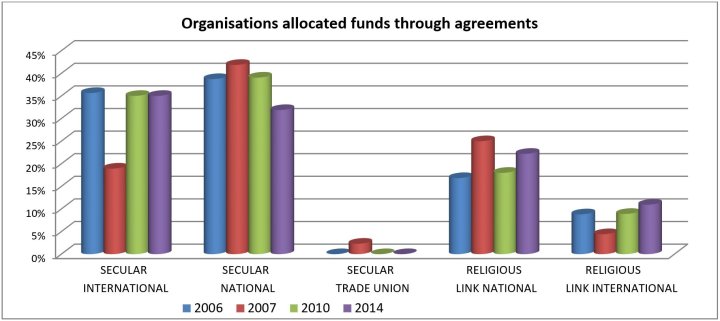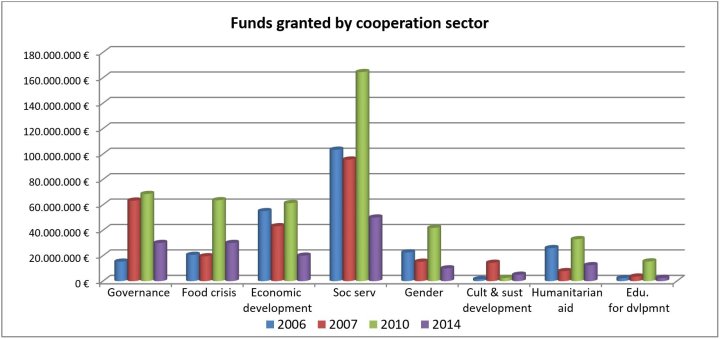Spain’s Official Development Aid in 2015 represented 0.13% of Gross National Income, a level reached in the 1980s.
65% of that ODA is obligatory contributions to multilateral institutions.
The funds earmarked for Civil Society Organisations (CSOs) have fallen by 71% in the last five years. The funds assigned via AECID agreements to Non Governmental Development Organisations as of 2016 totalled 1,120,348 euros.
The dismantling of funding for civil society - Pathways for updating Spanish Development Cooperation and ensuring the integration of all civil society actors within its support instruments (full report available here - in Spanish)
Scope and rationale of the report
The latest Aid Watch report (2016) published by CONCORD provides alarming data on the evolution of Official Development Aid (ODA) in the European Union, and most particularly in Spain. Spain is in a weak position with regard to the challenge of effectively implementing the new 2030 Agenda for Sustainable Development.
In light of this situation, the Peace and Solidarity Institute of the Primero de Mayo (First of May) Foundation of the CCOO, deemed it fitting to contribute to the debate with an analysis of the figures and the trends in Spanish development cooperation funding for civil society, together with a series of proposals aimed at securing greater predictability and success from both the instruments and the funds, in order to improve the capacity of Civil Society Organisations (CSOs) to influence Spanish Development Cooperation.
Spanish development cooperation and trade union development cooperation
Trade union development cooperation has been an integral part of the areas where Spanish development cooperation has developed its work since the very beginnings of the system. Trade union organisations play a key role in all aspects of governance in developing countries, and it is essential that this role be institutionalised, as pointed out by the Trade Union Development Cooperation Network of the International Trade Union Confederation in its document, Decent Work and Social Dialogue to Leave No One Behind. Trade Union Position on the Revision of the European Consensus on Development (September 2016).
Trade union development cooperation is aimed at strengthening trade unions in their role as development agents, with a view to progressing towards more just and more equitable societies. Solidarity and rights are at the core of the Peace and Solidarity Institute’s identity. The institute was created to cooperate with the economic and social development of nations, to promote human rights and fight poverty, to strengthen democratic and class trade unionism and to raise awareness among workers in Spain about the economic, social and labour problems around the world and to involve them in international cooperation initiatives. Peace and Solidarity has been working for over 20 years in international cooperation, covering a wide range of countries on the African, Asian and American continents.
“Agreements” are one of the various Spanish development assistance financing instruments available to CSOs. Their aim, as stated in the regulations, is to “respond to longer term and higher impact strategies”. After years in operation, a series of deviations has been observed, such as the excessive imposition of rigorous controls in the management of the subsidies to CSOs, which has led to the loss of local partners, or the huge dysfunctions created between Spanish organisations owing to the significant imbalances in their financing.
Trends in the evolution of funds and sectors
Since the agreements were implemented in 2006, a total of 1,120,348,487 euros have been allocated in funds, distributed, although not uniformly, over four calls for proposals. During these calls, only in the year 2007 were resources assigned to trade union development cooperation, with funds of 25 million euros (10% of the funds corresponding to that call for proposals), distributed between Spain’s various trade union organisations.
As for the sectors supported by Spanish development assistance over the years, the basic social services sector has grown much more than the others. By contrast, there has been a progressive reduction in support for sectors such as governance, economic development, gender, cultural and sustainable development and education for development.
It should be highlighted that national-level, secular CSOs, including trade union organisations, develop initiatives in the sectors of governance, economic development, basic social services and gender. As such, they are focussed on working with initiatives that are longer term and require greater adaptability, in sectors that involve processes of change, citizenship building, awareness raising, etc. It is also the national-level and secular CSOs that focus on education for development initiatives, aimed as building responsible, conscious and solidarity-based citizenship among the Spanish population. As a result, the drastic cuts in development cooperation funds in Spain have, above all, affected the local fabric. The wide experience gained in the sectors of governance, economic development, gender and education for development had become one of the appreciable and recognised hallmarks of Spanish development cooperation.
In light of this situation, the need has emerged for a debate that political decision makers should take into account if Spanish development cooperation genuinely wants to align with the new 2030 Development Agenda.
Recommendations
The latest peer review of Spain by the OECD Development Aid Committee (DAC) set out a series of findings and recommendations, among which the following should be underlined:
- “Spain should – while including results reporting – simplify its reporting requirements for NGOs to reduce transaction costs and strike a balance between accountability and learning.”
- “Budget cuts have prevented a number of planned calls for proposals, which has impaired the complementary strengths of the funding instruments, made funding unpredictable and affected CSOs’ ability to plan and programme.”
One of the most important elements in the report is the recommendation that the calls for proposals aimed at political parties and other types of organisations for international cooperation development activities be integrated within a single fund, thus facilitating complementary strengths, the alignment of the different activities and increasing the transparency and the effectiveness of the various organisations receiving public funds.




